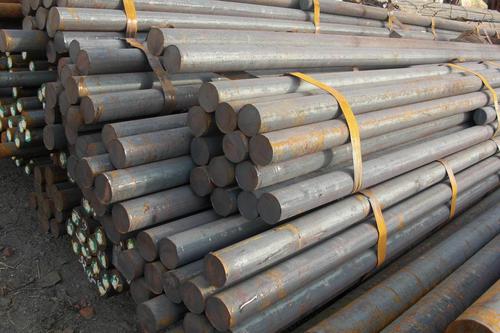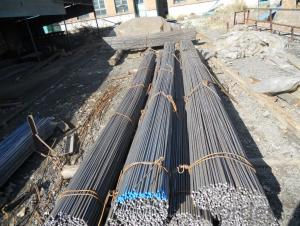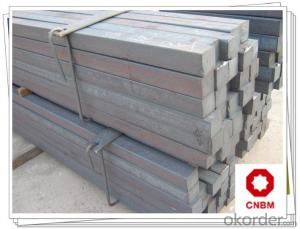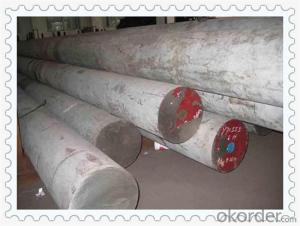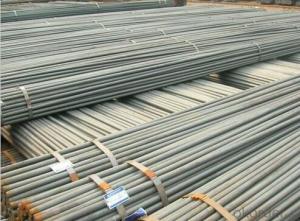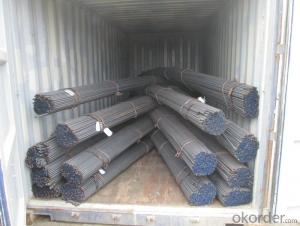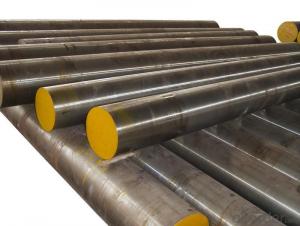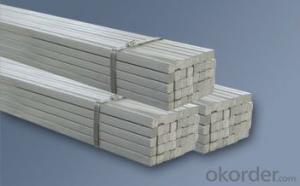Q345 Steel Round Bar
- Loading Port:
- China Main Port
- Payment Terms:
- TT OR LC
- Min Order Qty:
- -
- Supply Capability:
- -
OKorder Service Pledge
OKorder Financial Service
You Might Also Like
Specifications of Steel Round Bar:
1. Standard: GB
2. Grade: Q345
3. Invoicing on theoretical weight or actual weight as customer’s request
4. Shape: Round bar, solid bar of steel with circular section
5. Technique: Hot rolled
Size:
| Size (mm) | Section Area (cm2) | Mass (Kg/m) |
| 50 | 1962.5 | 15.4 |
| 80 | 5024 | 39.5 |
| 100 | 7850 | 61.7 |
Packaging & Delivery of Steel Round Bar:
Packaging Detail: Standard seaworthy packing or as customer required; all goods are packed in bundle with steel strips and shipped by break bulk vessel or container
Delivery Detail: 45 days
Trade terms: FOB, CFR, CIF or as customer required
MOQ: 25 tons per specification; we can negotiate the quantity if the specification is normal or we have stock of one specification.
Weight: The price invoicing on theoretical weight basis or actual weight basis depends on customer’s request.
Shipment: The shipment of bulk break or container is depends on customer’s request.
Documents given: Full set (3/3) of original clean on board bill of lading; Original signed commercial invoice, in 3 originals and 3 copies; Original packing list in 3 originals and 3 copies; Policy of insurance; Certificate of origin and what the target market needs.
* If you would like to get our price, please inform us the size, standard/material and quantity. Thank you very much for your attention.
- Q: What are the different types of steel round bar sizes?
- The different types of steel round bar sizes vary depending on the specific requirements and applications. Common sizes range from 1/4 inch to 24 inches in diameter. Additionally, steel round bars can be found in metric sizes, typically ranging from 6mm to 600mm in diameter. It is important to note that the availability of sizes may vary depending on the supplier and location.
- Q: Can steel round bars be used in manufacturing equipment?
- Yes, steel round bars can be used in manufacturing equipment. Steel round bars are commonly used in the manufacturing industry due to their various advantageous properties. They are known for their high strength, durability, and resistance to wear and tear. These properties make steel round bars ideal for use in heavy-duty machinery and equipment. They can be used to manufacture components such as shafts, axles, pins, and gears, which are crucial for the proper functioning of machinery. Additionally, steel round bars can be easily machined, welded, and formed into various shapes, making them versatile for use in different manufacturing applications. Overall, steel round bars are a reliable and widely used material in the manufacturing industry for the construction of equipment.
- Q: Can steel round bars be used in the manufacturing of firearms?
- Indeed, the utilization of steel round bars is feasible in the manufacturing process of firearms. Due to its exceptional strength and durability, steel is frequently employed as a primary material in the construction of firearms. These round bars can be expertly machined and formed into diverse components of a firearm, including barrels, bolts, receivers, and triggers. The hardness and caliber of the steel implemented in the manufacturing of firearms play a vital role in guaranteeing the dependability and safety of the weapon. Thus, it is commonplace to employ steel round bars that satisfy the requisite specifications and standards in the production of firearms.
- Q: What is the maximum carbon content allowed for steel round bars?
- The maximum carbon content allowed for steel round bars typically ranges from 0.25% to 0.30%.
- Q: Can steel round bars be galvanized?
- Yes, steel round bars can be galvanized. Galvanizing is a process of coating steel with a layer of zinc to protect it from corrosion. This process is commonly used to increase the longevity and durability of steel products, including round bars.
- Q: How do steel round bars compare to aluminum or steel tubing?
- Steel round bars, aluminum tubing, and steel tubing all have their own unique properties and applications, so it is important to understand the characteristics of each material before making a comparison. Steel round bars are solid cylindrical bars made of steel. They are known for their high strength and durability, making them suitable for heavy-duty applications. Steel round bars have excellent tensile strength and can withstand high levels of stress and pressure. They are often used in construction, manufacturing, and engineering projects where strength and structural integrity are crucial. Steel round bars are also highly resistant to corrosion, making them suitable for outdoor and marine applications. Aluminum tubing, on the other hand, is made from aluminum, which is a lightweight and corrosion-resistant material. Aluminum tubing is known for its excellent thermal conductivity and electrical conductivity. It is often used in applications where weight reduction is important, such as in the aerospace and automotive industries. Aluminum tubing is also commonly used in the construction of heat exchangers and in electrical wiring systems due to its conductivity properties. Steel tubing, similar to steel round bars, is made of steel but is hollow in shape. Steel tubing is known for its versatility and wide range of applications. It is available in various shapes and sizes, including round, square, and rectangular, allowing for different structural designs. Steel tubing is often used in construction, automotive manufacturing, and industrial applications. It offers high strength and rigidity, making it suitable for applications that require structural support or the ability to withstand heavy loads. In comparison, steel round bars offer superior strength and durability compared to aluminum and steel tubing. They are ideal for heavy-duty applications that require high levels of strength and structural integrity. However, steel round bars can be heavier and more expensive than aluminum tubing, which is often preferred for lightweight applications. Steel tubing, on the other hand, provides versatility in terms of shape and size, allowing for more design options. Ultimately, the choice between steel round bars, aluminum tubing, and steel tubing depends on the specific requirements of the application, including factors such as strength, weight, cost, and corrosion resistance. It is important to carefully evaluate these factors and consult with experts to determine the most suitable material for a particular project.
- Q: What are the different types of steel round bar alloys used in the automotive industry?
- Different types of steel round bar alloys are utilized in the automotive industry for their distinct properties and applications. 1. Carbon Steel: Carbon steel round bars are extensively employed due to their favorable attributes of strength and toughness. They find use in various automotive components like axles, crankshafts, and gears. 2. Alloy Steel: Alloy steel round bars comprise additional alloying elements such as chromium, nickel, or molybdenum. These alloys enhance the mechanical properties of the steel, rendering it stronger and more durable. Automotive applications like suspension components, drive shafts, and steering components commonly employ alloy steel round bars. 3. Stainless Steel: Automotive applications that demand durability in harsh environments benefit from the highly corrosion-resistant nature of stainless steel round bars. Exhaust systems, fuel tanks, and body parts are frequently made using stainless steel. 4. Tool Steel: Tool steel round bars exhibit high hardness, wear resistance, and toughness. They are predominantly used in the production of automotive tools and dies, like punches, dies, and cutting tools. 5. Bearing Steel: Bearing steel round bars are specifically designed to offer excellent wear resistance and high load-carrying capacity in automotive bearings. These bars possess a high level of hardness and undergo heat treatment to ensure optimal performance. 6. Spring Steel: Automotive suspension systems and other applications that necessitate exceptional elasticity and fatigue resistance utilize spring steel round bars. These bars are capable of enduring repeated stress while maintaining their shape, making them ideal for automotive springs and stabilizer bars. It is crucial to consider the desired properties, performance requirements, and cost considerations of each automotive component when selecting a specific steel alloy.
- Q: Are steel round bars available in different lengths?
- Yes, steel round bars are available in different lengths. Steel round bars come in various lengths to accommodate different needs and applications. The length options can vary depending on the supplier or manufacturer. Common lengths for steel round bars range from 6 to 12 feet, but custom lengths can also be obtained through special requests. The availability of different lengths allows for greater flexibility in construction and fabrication projects, as it enables the bars to be cut or modified to specific requirements.
- Q: What are the maximum allowable stresses for steel round bars?
- The maximum allowable stresses for steel round bars depend on various factors such as the grade of steel, the type of loading, and the design code being followed. In general, the maximum allowable stress for steel round bars is determined by the yield strength of the steel. The yield strength is the stress at which permanent deformation or yielding of the material occurs. Different grades of steel have different yield strengths. For example, mild steel typically has a yield strength of around 250 MPa (megapascals), while high-strength low-alloy (HSLA) steel can have a yield strength of up to 550 MPa. To determine the maximum allowable stress, typically a safety factor is applied to the yield strength. This safety factor takes into account uncertainties in material properties, loadings, and potential variations in manufacturing processes. The safety factor can vary depending on the application and design code being followed. For example, in structural steel design, the American Institute of Steel Construction (AISC) specifies a safety factor of 1.67 for the yield strength. This means that the maximum allowable stress would be the yield strength divided by 1.67. It is important to consult relevant design codes, standards, or engineering specifications for specific applications to determine the appropriate maximum allowable stresses for steel round bars.
- Q: How are steel round bars tested for quality and compliance?
- Steel round bars are tested for quality and compliance through various assessment methods such as visual inspection, dimensional measurements, chemical composition analysis, and mechanical property testing. These tests ensure that the bars meet the required standards, strength, and durability for their intended applications.
Send your message to us
Q345 Steel Round Bar
- Loading Port:
- China Main Port
- Payment Terms:
- TT OR LC
- Min Order Qty:
- -
- Supply Capability:
- -
OKorder Service Pledge
OKorder Financial Service
Similar products
Hot products
Hot Searches
Related keywords



